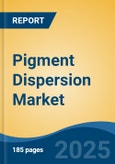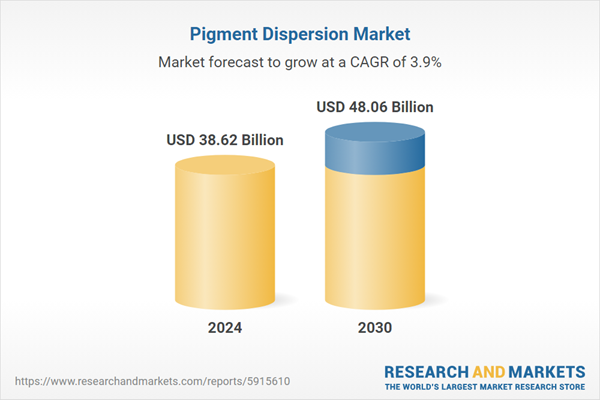Speak directly to the analyst to clarify any post sales queries you may have.
10% Free customizationThis report comes with 10% free customization, enabling you to add data that meets your specific business needs.
Key Market Drivers
Growing Demand in End User Industries
The pigment dispersion market is witnessing significant momentum due to rising demand across multiple end-user industries. Sectors such as paints and coatings, plastics, and cosmetics are major growth contributors. The paints and coatings industry, in particular, is fueling market expansion as global construction surges and the need for aesthetically superior, color-precise solutions increases. Pigment dispersions fulfill this need by offering consistency and customizable color options. Additionally, the textile industry benefits from pigment dispersions through vibrant dyeing and printing applications that align with fast-evolving fashion trends. The rapid development of the global textile sector continues to be a major driver accelerating the growth of the pigment dispersion market.Key Market Challenges
Regulatory Compliance
A significant challenge for pigment dispersion manufacturers is complying with strict environmental regulations imposed globally. These standards aim to reduce environmental impact and require companies to invest heavily in sustainable technologies and practices. This compliance not only adds financial strain but also demands operational adjustments. Moreover, manufacturers must ensure their products meet comprehensive safety and labeling requirements, adhere to workplace safety protocols, and avoid hazardous substance exposure. Navigating such complex regulatory landscapes is essential to maintain market credibility and consumer safety.Key Market Trends
Shift Towards Sustainable Formulations
The pigment dispersion industry is undergoing a transformation with a notable shift toward sustainable formulations. This change is driven by increased consumer preference for eco-friendly products and heightened regulatory expectations. Manufacturers are integrating green chemistry principles and sustainably sourced raw materials into their products. Regulatory initiatives such as the EU’s REACH and the U.S.EPA’s Safer Choice Program are prompting a move toward low-VOC, non-toxic, and biodegradable dispersions. Industries like textiles, plastics, cosmetics, and coatings are transitioning to environmentally responsible formulations to align with ESG standards and consumer demands. Beyond formulations, manufacturers are also adopting eco-conscious production methods that conserve energy, reduce waste, and lower water usage. A notable example includes Archroma’s launch in October 2024 of a bio-based pigment printing system under the NTR Printing System, which uses renewable inputs for all core components - setting a new benchmark for sustainability in the industry.
Key Market Players
- DIC Corporation
- AArbor International Corporation
- Clariant Corporation
- American Elements
- DECORATIVE COLOR & CHEMICAL, INC.
- Ferro Corporation
- Flint Group
- Heubach GmbH
- Organic Dyes and Pigments
- Reitech Corporation
Report Scope:
In this report, the Global Pigment Dispersion Market has been segmented into the following categories, in addition to the industry trends which have also been detailed below:Pigment Dispersion Market, By Type:
- Inorganic Pigment
- Organic Pigment
Pigment Dispersion Market, By Application:
- Coatings
- Adhesives
- Sealants
- Elastomers
Pigment Dispersion Market, By Formulation:
- Water-Based Formulation
- Solvent-Based Formulation
Pigment Dispersion Market, By Region:
- North America
- United States
- Canada
- Mexico
- Europe
- France
- United Kingdom
- Italy
- Germany
- Spain
- Asia-Pacific
- China
- India
- Japan
- Australia
- South Korea
- South America
- Brazil
- Argentina
- Colombia
- Middle East & Africa
- South Africa
- Saudi Arabia
- UAE
Competitive Landscape
Company Profiles: Detailed analysis of the major companies present in the Global Pigment Dispersion Market.Available Customizations:
With the given market data, the publisher offers customizations according to a company's specific needs. The following customization options are available for the report.Company Information
- Detailed analysis and profiling of additional market players (up to five).
This product will be delivered within 1-3 business days.
Table of Contents
Companies Mentioned
- DIC Corporation
- AArbor International Corporation
- Clariant Corporation
- American Elements
- DECORATIVE COLOR & CHEMICAL, INC.
- Ferro Corporation
- Flint Group
- Heubach GmbH
- Organic Dyes and Pigments
- Reitech Corporation
Table Information
| Report Attribute | Details |
|---|---|
| No. of Pages | 185 |
| Published | July 2025 |
| Forecast Period | 2024 - 2030 |
| Estimated Market Value ( USD | $ 38.62 Billion |
| Forecasted Market Value ( USD | $ 48.06 Billion |
| Compound Annual Growth Rate | 3.9% |
| Regions Covered | Global |
| No. of Companies Mentioned | 10 |









